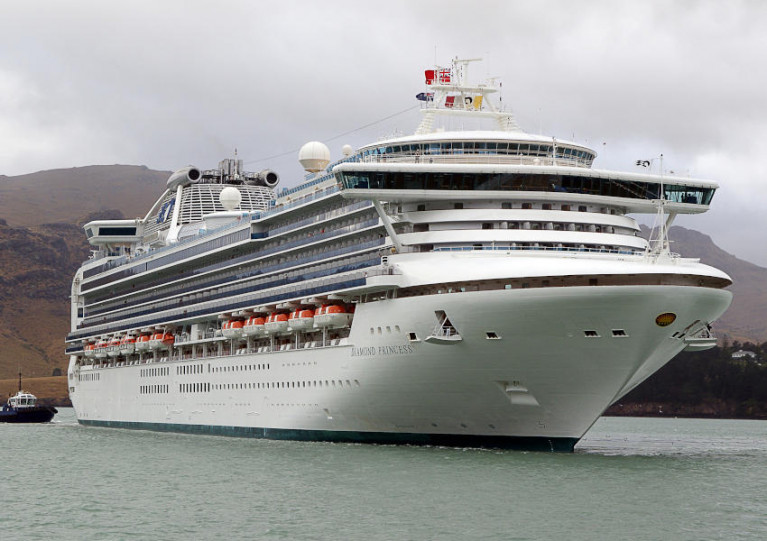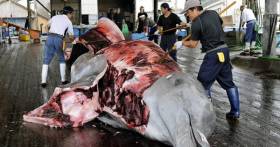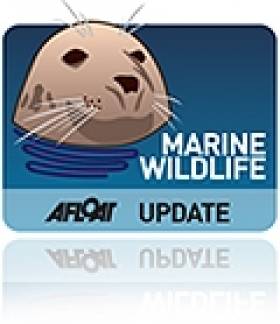Displaying items by tag: japan
SailGP organisers made the surprise announcement on Friday (15 July) that they were pausing the participation of Japan SailGP Team “indefinitely”.
According to Sail-World, the move was prompted by a shortage of boats, with only nine vessels ready to sail for the 10 confirmed teams in Season 3. A tenth is under construction but was not expected to be available until after Season 3’s third event in Portsmouth later this month.
It’s understood that SailGP Japan, skippered by Nathan Outteridge, was believed to be the team with the least sponsorship among those without a full franchise, despite their second-place finish in Season 2. Organisers cited “logistical and commercial considerations” in their decision.
SailGP’s statement added: “The league would like to thank Nathan Outteridge and all of the athletes and staff involved in the Team for their outstanding performance in the first two seasons of SailGP and wish them all the very best for the future.
“Season 3 will continue with nine teams racing for the remainder of the season.”
The current season kicked off in Bermuda on 14-15 May, with Chicago hosting the second state on 18-19 June. Australia, skippered by Tom Slingsby, has won both events thus far — with Great Britain (Sir Ben Ainslie) and Canada (Phil Robertson) trading the other podium positions.
Irish citizens are among the hundreds of passengers quarantined on a cruise liner in Japan amid the coronavirus epidemic, the Department of Foreign Affairs has confirmed.
According to RTÉ News, 454 cases of coronavirus have been diagnosed in the Diamond Princess, with a further 99 testing positive for the virus.
The British ship had 3,700 passengers and crew on board when it was initially detained by Japanese authorities in Yokohama on 4 February.
The United States has already evacuated more than 300 citizens and their family from the ocean liner, with 14 positive readings for the virus among them. RTÉ News has more on the story HERE.
As previously reported on Afloat.ie, here the HSE has instituted a new reporting protocol for ships entering Irish ports over the outbreak, which has killed more than 1,700 people in China and a small number abroad.
Whaling in Japan Resumes Commercially
Today a small Japanese fleet caught their first whales in the nation's first commercial hunt in more than three decades, a move that has aroused global condemnation and fears for the fate of whales.
Japan RTE reports has long said few whale species are endangered and announced in December it was leaving the International Whaling Commission (IWC) to resume hunting after years of campaigns by industry supporters and Prime Minister Shinzo Abe, whose constituency includes a city that has long whaled.
"If we had more whale available, we'd eat it more," said Sachiko Sakai, a 66-year-old taxi driver in Kushiro, a port city on the northernmost main island of Hokkaido, where five whaling ships were waved out of harbour in a brief ceremony early this morning.
"It's part of Japan's food culture," said Sakai, adding that she ate a lot of whale as a child. "The world opposes killing whales, but you can say the same thing about many of the animals bred on land and killed for food."
For more click here including a history of whaling in Japan
Ireland Joins Demarche To Japan Over Whaling Plans
#MarineWildlife - On Monday 7 December, Ireland today joined with a number of other countries in a demarche to the government of Japan about its whaling activities.
The demarche expresses “serious concern” at Japan's decision to resume whaling in the Southern Ocean under what it calls its “New Scientific Research Whale Programme in the Antarctic Ocean (NEWREP-A)”.
The demarche recalls the decision of the International Court of Justice in 2014 which held that Japan’s previous Southern Ocean whaling programme was not “for purposes of scientific research” under the International Convention for the Regulation of Whaling 1946 and was therefore unlawful.
The countries participating in the demarche note that the last Annual Meeting of the Scientific Committee of the International Whaling Commission held in June 2015 was unable to confirm that Japan had done enough to justify commencement of lethal sampling in the 2015/16 season.
In expressing concern to Japan, Ireland and the other participating countries urge the government of Japan as a member of the International Whaling Commission to respect the commission’s procedures, stress that there is no scientific basis to include lethal methods in NEWREP-A, and strongly request the government of Japan not to engage in this whaling programme.
Other member states of the EU and New Zealand also participated in the joint demarche.
Japan To Resume Whaling Despite Court Ruling
#Whaling - Japan is set to resume whaling for minke whales off Antarctica in the new year in spite of a ruling by the International Court of Justice banning such activity.
According to BBC News, Japan says it has taken the court's decision into consideration – and maintains that it will only resume whaling in the Southern Ocean for "scientific" purposes.
But Australia, which won its case against Japan at the International Court of Justice in 2014, has restated its opposition to the move, with the country's environment minister Greg Hunt saying: "We do not accept in any way, shape or form the concept of killing whales for so-called 'scientific research'."
As previously reported on Afloat.ie, Irish marine research was cited by an expert panel at the International Whaling Committee that struck down Japan's 'scientific whaling' plan for lacking detail to determine how many minke whales would be hunted and for what exact purpose.
BBC News has more on the story HERE.
Tributes Paid To Japan's Sailing Legend Masayuki Ishii
#Star - Sail World reports on the death of Japanese sailing legend Masayuki Ishii from pneumonia at the age of 82 last month.
Known to his friends around the world as Masa, his long career in the paper industry honed skills easily transferable to the finer details of hull and sail design.
No wonder then that he garnered acclaim as a judge and umpire for the International Sailing Federation (ISAF) at countless world championships, the Whitbread Round the World Race (now the Volvo Ocean Race) and the Olympic Games.
But he was also a sailor of some renown himself, competing for Japan in the Star Class at the 1984 Olympics in Los Angeles.
Sail World has much more on the story HERE.
Live Giant Squid Filmed For First Time
#MarineWildlife - The video above is a world first for marine biology - the first known footage of a living giant squid in the ocean.
The remains of the elusive beast have been captured before, but news has now come out that a team of marine scientists finally recorded video of a living specimen deep below the surface off Japan's Ogasawara islands.
As RTÉ News reports, last July the team - working on a documentary for Discovery and Japanese TV network NHK - used a small submersible equipped with near-infrared lights invisible to both squid and human eyes.
After 100 attempts, they finally attracted the attention of a three-metre long cephalopod - small by giant squid standards, but the largest ever seen alive.
"It was stunning." said zoologist and team leader Tsunemi Kubodera. "I couldn't have dreamt that it would be so beautiful. It was such a wonderful creature."
The documentary Monster Squid: The Giant Is Real will be broadcast on the Discovery Channel in the US on 27 January, and hopefully will appear on Discovery UK & Ireland soon after.




























































